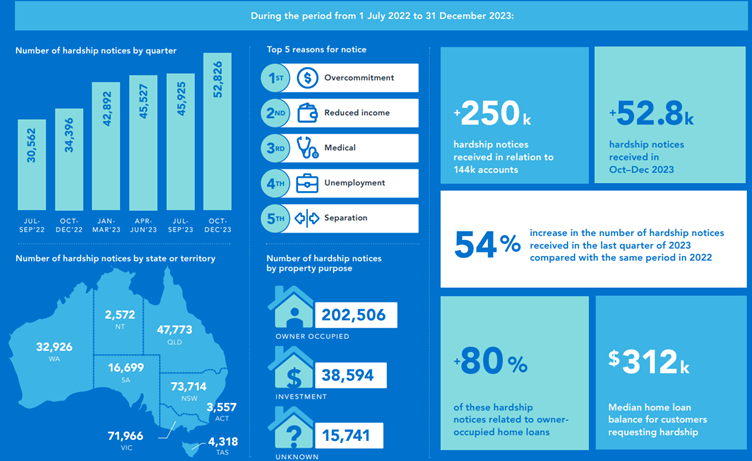

The Australian Banking Association (ABA) has responded to an ASIC financial hardship review of 10 large home lenders, which found they should be doing more to support Australians who were struggling to meet their repayments.
The report found that some lenders had made accessing financial assistance so difficult that more than one in three (35%) Australians dropped out of the application process at least once.
The report also found 40% of customers who received hardship assistance through reduction or deferral of payments, fell into arrears right after the assistance period ended.
However, ABA CEO Anna Bligh (pictured) defended the actions of banks.
“Every single week banks help thousands of Australians in financial trouble with a range of practical tools including restructuring loans to lower repayments, moving people to interest-only arrangements or potentially deferring payments for a period,” she said.
ASIC’s review into lenders financial hardship policies
In August 2023, ASIC issued an open letter to the CEOs of all lenders about financial hardship and the expectations of lenders.
ASIC then undertook a data collection involving 30 large lenders and released this report after reviewing 10 large home lenders to understand their approach to financial hardship.
This list of lenders included both banks and nonbanks, such as:
As increasing numbers of Australians struggle with cost-of-living pressures, ASIC Chair Joe Longo said, “In the worst cases, lenders ignored hardship notices, effectively abandoning customers who needed their support and were not meeting community expectations.
“For people who reach out to their lender to signal they need support, this can be devastating,” Longo said. “Too many Australians in financial hardship are finding it hard to get help from their lenders and it’s time for meaningful improvement.”
Overall, the report found four overarching themes:
The ASIC chair said lenders “must improve” the way they deal with customers experiencing hardship and “will not hesitate” to take enforcement action where appropriate.
Financial hardship: Crunching the data
While ASIC’s report may seem dire, it did offer some encouraging news for financially stressed customers in defence of the lenders’ actions.
Bligh said customers who are feeling the pinch financially should take heart from the fact that the report finds that 94% of all completed applications for assistance were approved.
While only 71% of all initial hardship requests were approved, this number jumps to a much higher 94% for those who complete the entire application process.
This is because some customers (23%) withdraw their application or fail to provide the necessary information. As a result, the actual denial rate for completed applications is just 6%.
Furthermore, while the report said that 35% of people dropped out of hardship applications, it didn’t outline the reasons why.
People might not proceed with a hardship application because of a range of reasons, such as circumstances changing or they no longer needed the support. Equally, they may have just found the process too confusing.
“Banks have longstanding arrangements in place to support people facing financial difficulty, including highly experienced and dedicated hardship teams ready to help customers,” said Bligh.
ASIC also said lenders engaged constructively throughout the review and acknowledged the importance of supporting customers experiencing financial hardship.
At least seven of the ten lenders had “significant programs underway” to improve their approach to financial hardship, according to the regulator.
Some were commencing or expanding their improvement programs and most recognised that further work is necessary to ensure they consistently support their customers experiencing financial hardship.
However, ASIC Commissioner Alan Kirkland, whose remit includes support for vulnerable consumers, said lenders were still not “putting customers front and centre” in their approach to financial hardship.
“Many lenders aren’t taking their customers’ unique situations into account, instead providing a standardised ‘one-size-fits all approach’, which is not meeting customers’ needs,” Kirkland said.
“We encourage people worried about making repayments to contact their lender and if not happy with the response, to lodge a complaint with them.”

Are non-banks the worst culprits?
Interestingly, the report distinguished a difference between banks and non-banks in how they approach financial hardship cases.
While the practices of the lenders reviewed “varied significantly”, ASIC found in general banks performed better than nonbanks and larger banks performed better than smaller banks.
However, it still identified gaps in the support provided by all lenders.
“We are encouraged to note that the report finds that banks do a better job than non-bank lenders and banks will continue to strive to give their customers the best possible service,” said Bligh.
For their part, a spokesperson from the Australian Finance Industry Association (AFIA), which represents both banks and non-banks, said it is reviewing ASIC’s findings into financial hardship practices.
“We will continue to work with members to improve the programs they have in place, ensuring they meet the evolving needs of customers as cost-of-living pressures continue to grow,” the AFIA spokesperson said.
ABA also said its members would consider the findings and work with ASIC on any further ways to support customers.
“In any organisation, there is always room for improvement,” Bligh said. “Banks stand ready support to customers.”
“That’s why the ABA has been running its ‘don’t tough it out on your own’ campaign, urging customers facing financial stress to reach out to their bank and get help.”
“The earlier people reach out to their bank, the easier and quicker it is for banks to put support options in place.”
To view the report, click here.
